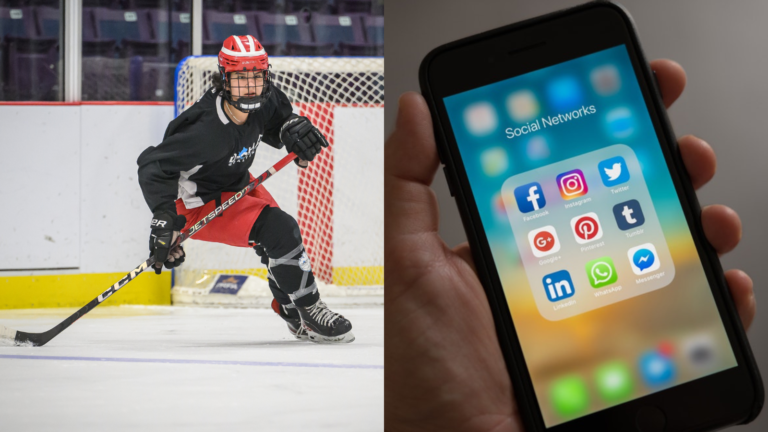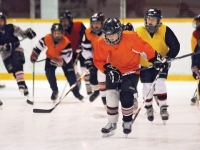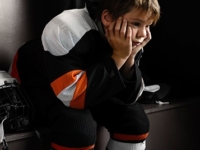Social Media’s Impact on Youth Hockey
Let’s face it: today is a difficult era for kids to grow up. The impact of social media and smartphones has provided problems that many of us never had in our youth. While the internet and smartphones have provided us with unlimited information directly at our fingertips, they have also created enormous social pressures for our children.
Social media has created things like cyberbullying, body image issues, and 24/7 peer pressure. It is in our homes, and classrooms, and has even made its way into youth sports. Is there a way to ensure that social media stays out of the locker room and off the ice? This article will discuss ways to eliminate the pressures of social media from youth hockey and how to maintain control over the team in the era of smartphones.
Keeping Social Media Out of the Locker Room
It’s a reality that is nearly unavoidable these days. Teenagers and social media have become two peas in the digital pod. Children are getting younger and younger when they first get a smartphone and it is having a serious impact on school and sports. Not everything about owning a smartphone is negative. First and foremost, it is a safety issue for many parents. A smartphone allows for direct contact and even lets parents know exactly where their children are.
However, nearly every school in Canada is facing an issue of kids accessing their smartphones during instructional time. Smartphones can be the ultimate distraction as well as a constant path of communication between youths.
When it comes to sports, it’s not unusual for kids to be distracted by their phones before a game or practice. How many coaches have struggled with kids playing on their phones instead of getting dressed for the ice? It’s not their fault. Smartphones were designed to be distracting and children already struggle with their attention spans.
Coaches need to implement the rule: no phones in the locker room. When you get to the rink, you should be prepared to play. Dedicate an hour or two to your teammates and improve your skills. No phones out while the coach is talking and no phones on the bench. You might laugh at that last point but kids see professional athletes and influencers bringing their phones onto the ice to film themselves and want to do the same.
Parents Should Also Control Social Media Use
We also need to be honest about who is really using social media to post photos and videos of youth sports. The parents need to tone down posts about their children when it comes to sports. We are all proud of our children but posting them on social media does open them up to anonymous criticism and bullying. This is especially true if you tag them in posts and over-celebrate their achievements. It’s perfectly fine to be proud of them but just know what you are doing when you upload things to social media.
Also, watch your kids without recording their games. Unless you watch the games back with them to improve their skills, just enjoy life in the moment. There’s a good chance that your kids will not stop playing at a certain age so you’ll want to enjoy every game while you can.
Build Confidence in Our Children
If there is one thing we need to do to help get our children through the age of social media, it is to instill confidence in them. This applies to all parenting and not just to kids who play hockey. Every child needs their parent’s support and we need to acknowledge their successes while supporting them in defeat.
Kids should be able to lose a game or be prepared to not be the best at something without losing any confidence. This ties in with the issue of body image and self-confidence. Social media and cyber-bullying can be quick to impact their mental health and a decrease in confidence can lead to poor performance on the ice or even wanting to quit the game altogether.
How can we limit the impact of social media? Try to control how much your children use it. I know it sounds like a losing battle, but try to implement some boundaries. Teach them to laugh at their failures and that losing is perfectly normal. If you are successful, then any online criticism should not hit them so hard.
Keep Your Kids On the Ice!
If you can do one thing to help with the issue of social media it is to keep your kids on the ice! Or the court or the field. Organized sports or any extracurricular activities are such a great way to keep your kids distracted from the negativity of social media. The more time they are sitting around doing nothing, the more it has a chance to hurt them.
It sounds easier said than done and it is. But if you find your child is being bullied or suffering from poor mental health due to social media, the worst thing you can do is to take them off the team. Being a part of a team and playing organized team sports is one of the healthiest things for youth. It teaches them skills like leadership and builds confidence that they otherwise wouldn’t learn.
Parents, Hang in There
It’s not easy, it never has been and never will be. Raising kids in the age of the internet and social media might be the biggest challenge any of us will ever face. But we need to hang in there and be strong. Coaches too. Coaches of youth sports may not realize just how influential they are in the development of these kids.
It takes a village to raise a kid and run a hockey team. We all need to stick together. No phones or social media in the locker rooms and certainly not on the benches. But as parents, we also need to know when to not over-post about our kids. Social media can be a wonderful tool for connecting with family and friends. But it can also be used as a weapon and we need to understand how to shield our children from being attacked.






